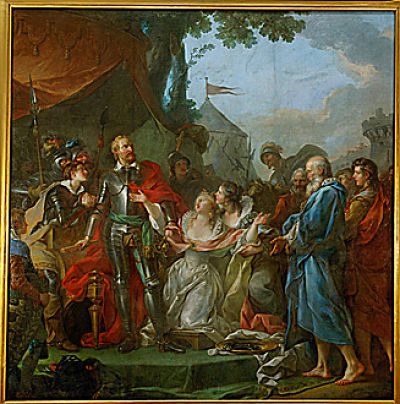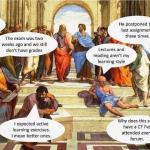
Genius needs company, so any company that tries to build on a solitary genius will fail.
How do we know?
The Bible suggests it, history supports it, and Shakespeare’s career proves it.
Shakespeare may have written none of Edward III, some of it, or all of it. Scholars disagree and where the experts are divided, we the mere fans must be humble. The consensus seems to be that the genius of Stratford-upon-Avon wrote about half of it. Edward III is no Henry V, but Edward isn’t Henry VI Part One either. If weaker than Shakespeare’s greatest king, Edward isn’t embarrassed with painting the Blessed Joan of Arc as a witch like his weakest Henry VI.
We can learn from the play, whoever wrote it, because there is wisdom in it that matches the composition. This is a play written by a group that shows the necessity of a community for genius and heroism to shine.
King Edward starts the play by rescuing a great lady who bravely endured a siege by the terrible Scots. He falls madly in love with this brave, beautiful, brilliant, but married woman, virtuous as she is brave.
He says he would enjoy her beauty and she says:
O, were it painted I would wipe it off
And dispossess myself to give it thee!
But, sovereign, it is soldered to my life:
Take one, and both, for, like an humble shadow,
It haunts the the sunshine of my summer’s life-
And:
As easy may my intellectual soul
Be lent away and yet my body live
As lend my body, palace to my soul,
Away from her and yet retain my soul.
My body is her bower, her court, her abbey;
And she an angel, pure, divine, unspotted,
If I should lend her house, my lord, to thee,
I kill my poor soul, and my poor soul me.
She tells the King, with rare courage, that the laws of God are higher and older than the laws of kings. She will not disobey God to please her earthly ruler.
King Edward has surrounded himself with good men. His poet will not help him seduce the lady . . . reminding him by his poetry of virtue. Her father pretends to pander for the King, but then says:
An honorable grave is more esteemed
That the polluted closet of a king.
The man who cries: “Character!” and then will submit his virtue to the vagaries of the powerful is either a fool or a hypocrite and probably both. The best news of the play is that when a good man wants to be bad (and who is not tempted?), but has surrounded himself with other good men, then going wrong is hard. His friends will not give him what he wants and finally his better nature prevails. He learns that if he would “conquer kings,” then he must subdue himself.
He is saved from misery, sin, and failure only by the character of those around him . . . particularly of the great Lady of Salisbury. So it is with all of us . . . our virtue requires a community, a church, and we dare not base our actions on our desires.
Beware the leader who does not have men and women around him who say: “No.” Beware the leader who will not hear: “No.” Follow the leader who will admit error, even grave error, and move forward to greater deeds. Follow the man who has surrounded himself with good and noble friends and knows that “profit must with honor be commixed.”
A good definition of a demagogue, and a would be tyrant, is the man who promises profit without honor.
The King goes to France and conquers as is his right.* To win, the King joins the energy of his young son, the Black Prince Edward, to the maturity of an older man. Edward wins knighthood and Audley wins immortality.
King Edward needed Prince Edward and the Black Prince needed his men. Community won the battle and provided a place for the great man to shine. Tolstoy was right that great men alone do not drive history, but he was wrong that they have no role. Carlyle and others made too much of what a great man can do without the common solider. Americans used to know GI Joe was just the guy on the ground, drafted to save democracy, and not a super hero with a Kung Fu grip. Ike needed GI Joe and that gives us all hope.
I am not (at least) a genius like Shakespeare, but I can be GI Joe and follow King Jesus to war.
All the plays have the marks of being written for the actors who would play the roles. I am sure that the plays, and the lines, evolved as they spoke them. Shakespeare needed help setting the stage, pulling off his effects, and filling the house. The audience, receptive to something better than the average spectacle, had to participate. Shakespeare would not have been Shakespeare if not for help.
Let’s follow King Jesus to battle, side with the saints and apostles, and win.
——————————————
*I am writing of Shakespeare’s history and Shakespeare’s Edward III. The actual “rights and wrongs” of history are harder to know!
William Shakespeare went to God four hundred years ago. To recollect his death, I am writing a personal reflection on a few of his plays. The Winter’s Tale started things off, followed by As You Like It. Romeo and Juliet still matter, Lady Macbeth rebukes the lust for power, and Henry V is a hero. Richard II shows us not to presume on the grace of God or rebel against authority too easily. Coriolanus reminds us that our leaders need integrity and humility. Our life can be joyful if we realize that it is, at best, A Comedy of Errors. Hamlet needs to know himself better and talks to himself less. He is stuck with himself so he had better make his peace with God quickly and should stay far away from Ophelia. Shakespeare gets something wrong in Merchant of Venice . . . though not as badly as some in the English Labour Party or in my Twitter feed. Love if blind, but intellectualism is blind and impotent in Love’s Labours Lost. Brutus kills Caesar, but is overshadowed by him in Julius Caesar. We should learn not to make Much Ado about Nothing. We might all be Antony, but if we would avoid his fate then we must avoid flattery and the superficial love of Troilus and Cressida. We are fools, but our goal should be to accept it and not to degenerate into Biblical fools during our Midsummer Night’s Dream. Richard III is a symptom of a bad leadership community, but be careful that use Measure for Measure to guide your reaction to the mess. The modern university is Iago in Othello playing on our sins to destroy the nation. You can’t accumulate your way to a great leader and personal piety in Henry VI (Part I) is not enough to make a great king. God will save the King, not our stupid partisan squabbles seen in Henry VI (Part 2) and not kingmakers as existed in Henry VI (Part 3). Fortunately, in God’s world All’s Well That Ends Well. Two Gentlemen remind me that being in love is grand. King John keeps winning and so loses. Slander always gives way to truth in Cymbeline. We need patrons, but God help us if we flatter them and lose them as Athens did with Timon of Athens. We need good leaders and not have to hope against reason that one turns out well like young Prince Hal in Henry IV Part One. Being powerful is all fun and games, until it isn’t as Henry learns in Henry IV Part Two. Virtue can be jolly and edgy, as The Merry Wives of Windsor show. We can all be shrews and need The Taming of the Shrew. Pericles did not live in a Zootopia, his world was more realistic. No revenge lest we end like Titus Andronicus. Shakespeare shows what the fusion of Christianity and classicism did for all of us in Venus and Adonis. It is hard to be delivered from evil, if we pursue it as did the evil man in The Rape of Lucrece. God save us from the leader like King Lear who rules by tricks and fear, though God will make things the best they can be, usually be sending us a Cordelia. Even she cannot win without a community, as Edward III demonstrates.











